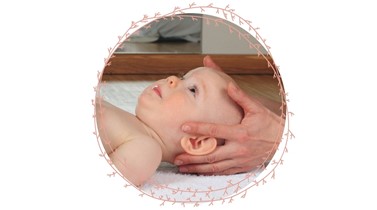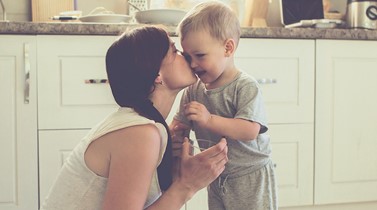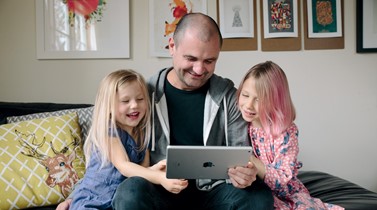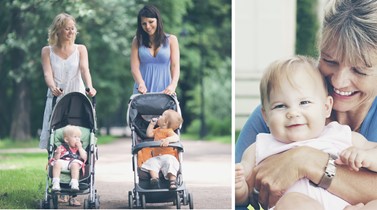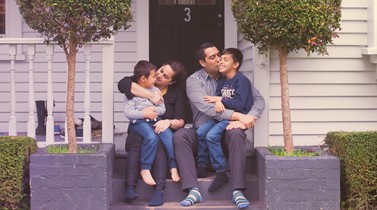How to connect with your parenting village
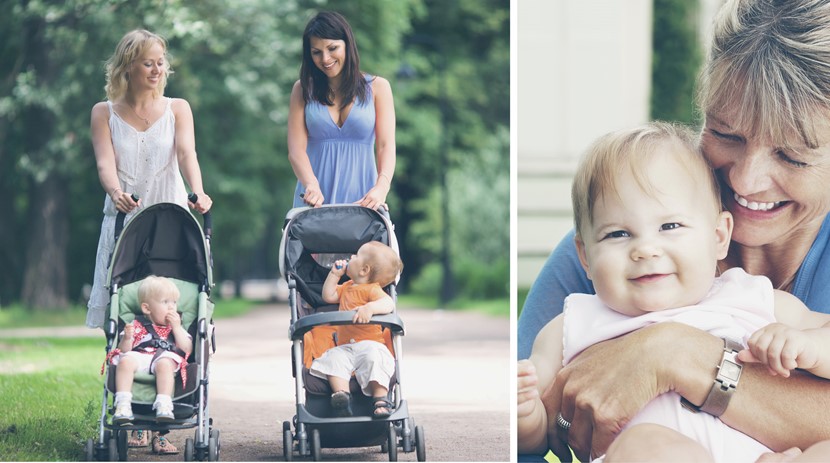
Raising kids is hard work and we weren’t designed to do it in isolation. But not all of us have family and friends ready and able to offer the support we so often need. Catherine Tafto describes how reaching out to the people in your neighbourhood can fill some vital gaps.
Heavily pregnant, I bundled the husband, three-year-old and five-year-old out the door and finally started cleaning. And then the phone rang — the last thing I needed — but like a sucker, I answered it anyway. A friend asking in a casual chatty voice what I was up to. “I have sent the boys to the airport to pick up the in-laws and I’m cleaning the house”, I replied.
“I will be there in 10 minutes.”
Kate is one of my 'Mum Mentors'. First and foremost, she is a friend – I enjoy her company. But to make it into the category of mentor, there are a few other factors at play. I like her children and her parenting style. The youngest of her three is the same age as the oldest of my three, which means she is far enough ahead on the parenting journey to have some wisdom to share, but not so far ahead she has forgotten what it is like to be where I am – no imploring me to “enjoy every minute” when I’m having an awful day. This age difference also serves as a reminder that, yes, you do make it out the other side of the preschool years with your sanity intact.
Building a support network around your family is essential. As parents, you need support and encouragement. However, deciding who you want in your children’s lives, to support and encourage them as they grow, is also important.
It's nice to have grown-ups around who our children enjoy and admire, reinforcing the values we want to impart, but it can also be a case of recognising areas we fall short and actively asking someone to contribute to our child’s life in that area.
This is all very well and good, but who? And how? Some people have extended family close by who share their values, but many will need to intentionally build a network.
The 'let’s figure it out together' crowd
There is something so comforting about going through it all for the first time with 'comrades' — being delighted and overwhelmed newbies with newborns. Emily took an antenatal class because she wanted to be prepared, and remembers wondering if she would be friends with anyone there. Seven years later, with eleven children between them, she has just come back from a second overseas holiday with three of the mothers from her class.
While the wider group gets together once a year, this foursome have become incredibly close friends and get together at least once a week. The relationships have gone well beyond just 'mum friends'. “I’ll call them if the children are driving me crazy but I will also bounce work and relationship problems off them” says Emily.
In an ideal world, we would all walk away from antenatal classes with a solid network, but stories of coffee groups gone awry abound. Most of us recognise that simply having children the same age is not enough to form the basis of a meaningful friendship.
So no coffee group, then what? Being bold and taking opportunities that present themselves is a good place to start. Find yourself in the breastfeeding corner at the work BBQ? Keep bumping into the same person at the playground? Be brave, strike up a conversation and maybe you’ll find someone you click with.
Trying a local playgroup, Playcentre or music class can feel intimidating at first. I remember going to Mainly Music for the first few times feeling sick with anxiety, but I continued going because my son loved it and I needed to leave the house. I now have some treasured friendships from that group.
There is also something to be said for good old-fashioned matchmaking. Using your existing networks, making yourself vulnerable and saying to a friend “I wish I had some nice friends with children the same age” could be all it takes – they may know just the person and can set you up. But like dating, you will possibly need a few attempts before finding The One.
Getting online is also a great way to connect with people; the OHbaby! forums have 'due in' threads, for example. These groups, dedicated to parents of babies expected or born each year, provide invaluable connection and the comradeship is obvious.
The 'on the same page' friend
Being a stay-at-home parent can be a wonderfully rewarding experience, but it comes with a side order of relentless tedium. Being a working parent can be a wonderfully rewarding experience, but it comes with a side order of relentless hamster-on-a-wheel busyness.
Finding people doing parenting the way you’re doing it, who can offer tips and encouragement to manage the low points, and remind you of why you have chosen this path when things are tough, can make a huge difference to your ability to push through.
Where to find them? Well, for the stay-at-home crowd: mid-week swimming lessons, music classes and playgrounds. And for the working crowd: you could try to connect with other parents through your childcare provider or through your professional networks.
Stay-at-home dads are definitely worth a special mention too, as this role can be isolating in its own way with men not always feeling welcome in the female-dominated early childhood space. Finding other stay-at-home dads to catch up with, either with the kids or without them, is important.
The 'our journey is taking a different path' crew
Whether it is infertility, multiple births, adoption, a child born with special needs or developing an illness, some of us are dealt a different hand. And if people are not in the club, no matter how empathetic or helpful they may be, they just don’t get it.
Finding people who do get it can make a huge difference, in both moral and practical support. This is one of the areas where the internet and social media can really come into their own.
When Amy and Aaron's four-year-old son Patrick was diagnosed with Rhabdomyosarcoma, a rare childhood cancer, they were blown away by the support from friends and family. But none of them really knew what the family were going through. "Meeting other families in Starship was important, both for us as parents and for Patrick as a patient" says Amy. "Being around people who knew what we were going through was sometimes easier.”
Amy also sought support online from a paediatric Rhabdomyosarcoma group. "Because Patrick’s cancer is so rare, there were not a lot of other people in New Zealand to talk to, but it’s been good to connect with these people, even though they are on the other side of the world", she says.
The substitute grandparents
Marianne and Mark live in Auckland with their two preschool boys, but Marianne’s family is in Norway and Mark’s in the South Island. This leaves a gaping hole where others would find family support.
However, Marianne has found a friend who has taken on the role of surrogate grandmother — even babysitting so they can fit in date nights. "It is hard being away from family, especially when you are raising children in a culture different to your own. Having someone to call on makes a big difference" says Marianne.
In the last year I have managed to acquire two sets of substitute grandparents, both of whom have grandchildren who live far away. They have us over for dinner, drop off feijoas, chutney and marmalade and have their own carseats so are available for emergency preschool pick-ups. They have even stepped in to do grandparent stuff at school and preschool when my own parents couldn’t. Plus, my children adore them.
So how do you find substitute grandparents? Again, your existing networks are a good place to start — parents of friends or friends of your parents, and thinking about who lives in your neighbourhood.
Outright asking people to fill that role in your children’s life may seem forward, but most people are touched – it is a huge compliment to be asked to influence the life of a child.
The village
When my brother asked me why we had chosen him as godfather to our firstborn, I said “Because if he grows up to be like you I will be happy”. Now a professional fireman, he is The Coolest Uncle Ever. With his geography degree he is also a good match for a boy who is fascinated by the natural world. When I am asked questions about rocks, I say “You know who you can ask?” and he answers “Uncle Andrew!”.
There may come a point when we realise we're not everything our child needs, for different reasons: as simple as a child who loves music saddled with parents who are tone deaf through to a single dad who wants his daughter to have some girl-time.
Asking someone if they will look out for your child in a special way is a gift to both. I have been asked as a middle-of-three-girls sister to keep a special eye on a little miss who is also a middle-of-three-girls sister. Her mother has three brothers, so feels inexperienced in the complexities of sisterly relationships. It feels such an honour to be asked. I also have a goddaughter and, as a mother of three sons, having a little girl I get to be special to is lovely.
Another key part of the village is the mutually helpful friend. While maybe not a lifelong best bud, you’ve been thrown together by your children. This is the friend you can call to collect your child from kindy when your baby is asleep, or you take their child to soccer because she is sick.
Nicola has two children and a newborn arriving any day. “Without my school carpool team I would be a lot more stressed out about the impending arrival”, she says. “Knowing that two mornings out of five I don’t have to get everyone in the car to do school drop-off is a big deal.” Setting up mutually beneficial arrangements is as simple as finding the right person, and asking.
When you think of an actual village, it isn’t all people at the same life stage. Keeping an open mind as to who can be a part of your team can open doors to some wonderful unexpected relationships. When we moved further away from family we needed to hire a babysitter for the first time. She came to visit with her mum, and we have since become great friends with the whole family.
The professionals
While relationships are key to a solid support network, it is important to recognise when it might be time to step things up a notch. Having a GP you trust is important, as they can be a good first stop if things are all starting to feel a bit much. Plunket and other services all have a place as well. I have used the Parent Coach service at The Parenting Place and found it invaluable.
And lastly, back to my friend Kate. Three weeks after helping me clean my house, she broke her ankle. When I showed up with dinner, she protested. I responded “If you want to give support, you also need to take it when it is offered – the give and take is the only way it can work”.
Make sure your relationships go both ways. Let people in and let them help you, we were never meant to do this in isolation.
Catherine Tafto is a freelance writer living in rural north Waikato with her husband and their three boys.

AS FEATURED IN ISSUE 35 OF OHbaby! MAGAZINE. CHECK OUT OTHER ARTICLES IN THIS ISSUE BELOW






